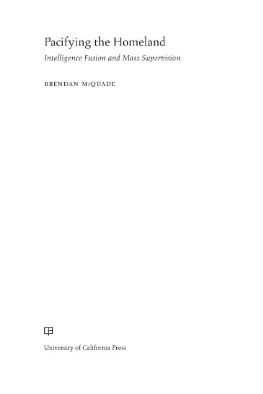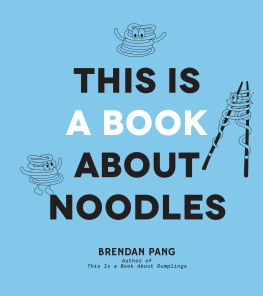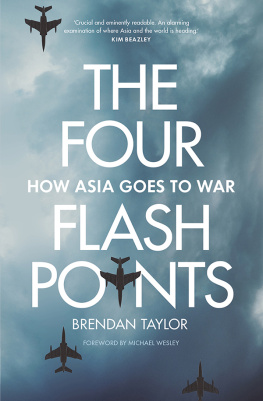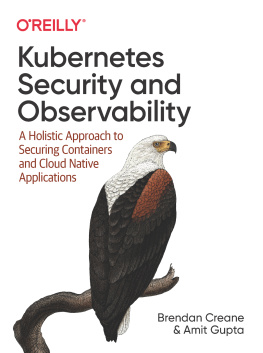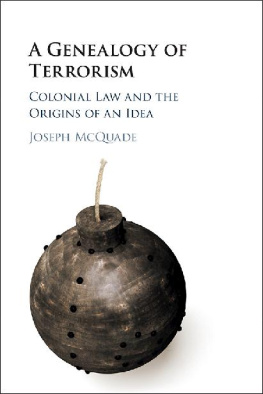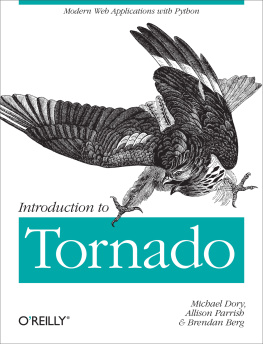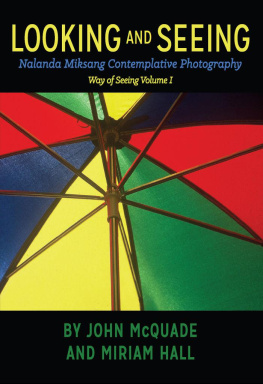Brendan McQuade - Pacifying the Homeland
Here you can read online Brendan McQuade - Pacifying the Homeland full text of the book (entire story) in english for free. Download pdf and epub, get meaning, cover and reviews about this ebook. year: 2019, publisher: University of California Press, genre: Politics. Description of the work, (preface) as well as reviews are available. Best literature library LitArk.com created for fans of good reading and offers a wide selection of genres:
Romance novel
Science fiction
Adventure
Detective
Science
History
Home and family
Prose
Art
Politics
Computer
Non-fiction
Religion
Business
Children
Humor
Choose a favorite category and find really read worthwhile books. Enjoy immersion in the world of imagination, feel the emotions of the characters or learn something new for yourself, make an fascinating discovery.
- Book:Pacifying the Homeland
- Author:
- Publisher:University of California Press
- Genre:
- Year:2019
- Rating:3 / 5
- Favourites:Add to favourites
- Your mark:
- 60
- 1
- 2
- 3
- 4
- 5
Pacifying the Homeland: summary, description and annotation
We offer to read an annotation, description, summary or preface (depends on what the author of the book "Pacifying the Homeland" wrote himself). If you haven't found the necessary information about the book — write in the comments, we will try to find it.
Pacifying the Homeland — read online for free the complete book (whole text) full work
Below is the text of the book, divided by pages. System saving the place of the last page read, allows you to conveniently read the book "Pacifying the Homeland" online for free, without having to search again every time where you left off. Put a bookmark, and you can go to the page where you finished reading at any time.
Font size:
Interval:
Bookmark:
Pacifying the Homeland
Pacifying the Homeland
Intelligence Fusion and Mass Supervision
BRENDAN M c QUADE

University of California Press
University of California Press, one of the most distinguished university presses in the United States, enriches lives around the world by advancing scholarship in the humanities, social sciences, and natural sciences. Its activities are supported by the UC Press Foundation and by philanthropic contributions from individuals and institutions. For more information, visit www.ucpress.edu.
University of California Press
Oakland, California
2019 by Brendan McQuade
Library of Congress Cataloging-in-Publication Data
Names: McQuade, Brendan, author.
Title: Pacifying the homeland : intelligence fusion and mass supervision / Brendan McQuade.
Description: Oakland, California : University of California Press, [2019] | Includes bibliographical references and index. |
Identifiers: LCCN 2019004170 (print) | LCCN 2019006629 (ebook) | ISBN 9780520971349 (ebook) | ISBN 9780520299740 (cloth : alk. paper) | ISBN 9780520299757 (pbk. : alk. paper)
Subjects: lcsh: TerrorismUnited StatesPreventionInformation services. | National securityUnited StatesInformation services. | Intelligence serviceUnited StatesInformation services. | Interagency coordinationUnited States.
Classification: LCC HV 6432 (ebook) | LCC HV 6432 . M 38 2019 (print) | DDC 363.325/170973dc23
LC record available at https://lccn.loc.gov/2019004170
Manufactured in the United States of America
26 25 24 23 22 21 20 19
10 9 8 7 6 5 4 3 2 1
For Silas and Eliot
Contents
Acknowledgments
While my name is on the cover of this book, a project like this one is never a solitary endeavor. It took me six years to research and write this book. Data collection took me all over New York and New Jersey. The analysis and writing occurred at three different universities. Over the years, many people helped me make this project possible. With this in mind, these acknowledgments should be read as the first draft of a long and extended thank you.
The first thanks must go to my wife, Alison Eromin, who has done so much, big and small, to make my scholarly career possible. The next thank you belongs to my parents, Michael and Diane McQuade, who have always supported and encouraged all my efforts. I also must acknowledge my oldest friends. My way of thinking has certainly been shaped by many conversations with Winslow Behney, Mike Horrigan, Tristan Kading, Chris Morrissey, and Sean Wimpfheimer.
Over these six years, many colleagues and friends have read drafts, provided useful comments at conferences, talked through the various arguments in the book, created opportunities for me to refine my work, and otherwise contributed to this endeavor. Thank you to Apurva, Samantha Applin, Toivo Asheeke, Michael Ashkin, Walden Bello, Matt Birkhold, Raymond Baldino, Carrie Brietbach, Simone Brown, Kade Crockford, Stephen Danley, John Eason, Lynn Eden, Cassie Follett, Samantha Fox, Colandus Kelly Francis, Leslie Gates, Zeynep Gnen, Shawn Gude, Darnell Hardwick, Herbert Haines, Euan Hague, Kevin Haggerty, Kevan Harris, Terrence Hoffman, Tim Holland, Will Jackson, George Joseph, Charlotte Kading, Nikolay Karkov, Rafael Khachaturian, Zhandarka Kurti, Jonghwa Kwon, Latoya Lee, Travis Linnemann, Walter Luers, Shiera Malik, William Martin, Alfred McCoy, Michael McIntyre, Reuben Miller, Xhercis Mndez, Jeffrey Monaghan, Torin Monahan, Mark Neocleous, Denis OHearn, Roberto Ortiz, Gulden Ozcan, Will Parrish, Brian Perkins, Andrew Pragacz, Joshua Price, Priscilla Regen, George Rigakos, Kevin Revier, Kelvin Santiago-Valles, Esra Sarioglu, Judah Schept, Stuart Schrader, Micol Seigel, Guillermina Seri, Meg Stalcup, Lisa Stampnitzky, Nicholas Walrath, Tyler Wall, Kristian Williams, and Alex Vitale. Out this group, the contributions of William Martin and Leslie Gates warrant an extra mention. Thank you, Bill, for the tireless commitment to your students. I wouldnt have an academic career without your guidance. Thank you to Leslie for reading every word of every draft of this book. Our writing group improved this book immeasurably and accelerated its passage to publication.
While researching and writing this book I was working with a variety of social movement organizations. My involvement in New York Students Rising, Binghamton Justice Projects, We Charge Genocide, Decarcerate Tompkins County, and the Ithaca chapter of the Democratic Socialists of America did much to shape my thinking. Of my many comrades and friends, a few conversations with Mariame Kaba were especially helpful in getting me to think through some of the wider implications of this study.
Although human subject protection prevents me from thanking them by name, I am also indebted to the many police officers, intelligence analysts, and others who agreed to be interviewed for this project and referred me to others. I am grateful to Gary Hamel, Kate Hoffman, Sabrina Robleh, Nicholle Robertson, Maura Roessner, and Madison Wetzell and all the staff at University of California Press for their professionalism and support. Im particularly thankful for the faith Maura Roessner showed in me. She believed in this project from day one, when I, a no-name, non-tenure-track professor, first pitched it to her in the summer of 2015. When I finally delivered something substantial to Maura two years later, her enthusiasm had not waned.
Prologue: Policing Camdens Crisis
Intelligence Fusion, Pacification,
and the Fabrication of Social Order
The creation of the Department of Homeland Security (DHS) and the Office of the Director of National Intelligence was the largest reorganization of the federal government since the reforms following World War II. Since these reforms sought to improve intelligence sharing, they did not remain limited to federal agencies. Not only did state governments set up their own homeland security agencies and offices, they also worked with federal agencies, professional associations, and private companies to build a series of interagency intelligence centers: what is now called the National Network of Fusion Centers. At these secure and secretive government facilities, teams of analysts do the work of intelligence fusion, mining disparate data sources and fusing them together to create useful information or intelligence. In 2004, a year after DHS officially opened its doors, the department recognized eighteen fusion centers. Two years later, that number increased to thirty-seven. Now there are seventy-nine DHS-recognized fusion centers.
The first fusion center I visited was the New Jersey Regional Operations Intelligence Center (ROIC, pronounced rock). The center is located at the sprawling New Jersey State Police (NJSP) Headquarters compound in East Ewing Township, an affluent suburb in a state that ranks as one of the wealthiest and most unequal in the Union. Inside, a security guard sits in an enclosed booth to take the names and identifications of visitors. After I checked in for the first time, the state trooper tasked with coordinating my visit led me to a main room where the intelligence analysts worked, swiping his key card to access the elevator and open doors. When we arrived, the fusion centerthe secretive intelligence facility I spent months trying to accesslooked like any other office: men (and a few women) dressed business casual, a maze of cubicles on the right, a few breakout areas with conference tables on the left.
As the result of a grant-driven federal initiative that stipulates baseline capabilities but no binding standards, no two fusion centers are alike. The variation from fusion center to fusion center can be dramatic. The phraseIf youve seen one fusion center, youve seen one fusion centerhas become clichd within the fusion center community. Official secrecy obscures fusion centers, so the little public information available on a particular fusion center rarely details its unique profile. For these reasons, I arrived at the ROIC with a series of basic questions that could not be answered from the outside.
Next pageFont size:
Interval:
Bookmark:
Similar books «Pacifying the Homeland»
Look at similar books to Pacifying the Homeland. We have selected literature similar in name and meaning in the hope of providing readers with more options to find new, interesting, not yet read works.
Discussion, reviews of the book Pacifying the Homeland and just readers' own opinions. Leave your comments, write what you think about the work, its meaning or the main characters. Specify what exactly you liked and what you didn't like, and why you think so.

